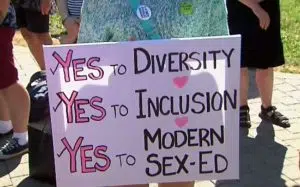Everyone likes a little change, but when it comes to children’s education, it can be a different story.
Ontario elementary teachers have taken the government to court over the provinces sex ed curriculum in part of a warning to educators that came along with it. Doug Ford’s government recently launched a website where parents can report concerns about teachers not sticking with the new curriculum. Many critics have called this a snitch line. Teachers are now to be disciplined for using any material from the 2015 sex ed curriculum. A public school teacher in the province explains why she is not impressed with the new changes.
“What frustrates me is what the message sends that we are rolling back to the old curriculum where many topics aren’t discussed. As someone who is a parent and who does equity work with the LGBTQ Community, I think this isn’t a good move for educational purposes. I strongly believe keeping the curriculum how it is would benefit kids in the long run.”
The 2015 update included lessons warning about online bullying and sexting, but opponents objected to parts addressing same-sex relationships and gender identity. Critics have also accused the Liberals of not consulting enough with parents. Lynn Buchelt is one of them. She believes that teaching issues such as consent, LGBTQ relationships and gender identities are vital for student safety, well-being and inclusivity.
“As a mother of two teenaged daughters, I feel that it’s important for them and for their peers to be educated on how the world has evolved. By educating everyone about these topics, there will be less discrimination and more acceptance.”
Some parents aren’t comfortable to speak about certain topics with their children, they rely on the schools to educate their kids appropriately. Right now, a big controversial topic is the government not being inclusive to LGBTQ students. Buchelt adds to this.
“The LGBTQ community is vitally important to be talked about in the classroom. Some parents say the more educated children are at a younger age about these sorts of things, the more sexual they will be. That certainly is not the case. But the lack of information in youth can be problematic.”
Ultimately, sex education means learning about ones body, about sexual expression, and about safety. Students should be equipped to keep their intimate lives growing and improving for the rest of their lives.












